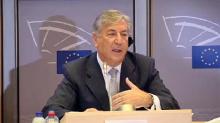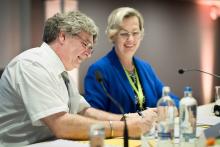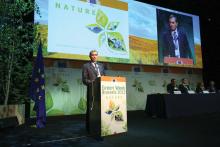In September, the newly-elected European Commission President Jean-Claude Juncker revealed his 27 Commissioners to take office from November 1 2014.
Juncker has seven vice-presidents and will be supported by Frans Timmermans (S&D, The Netherlands) as first vice-president and Commissioner in charge of Better Regulation, Inter-institutional Relations, the Rule of Law and the Charter of Fundamental Rights.
Among Juncker’s priorities as Commission President are to counter excessive bureaucracy; to aim for better regulation; to deliver jobs and growth, and to promote investments.
The designated Commissioners relevant for UEPG and their portfolios are:
- Internal Market, Industry, Entrepreneurship and SMEs: Elbieta Biekowska (EPP, Poland).
- Environment, Maritime Affairs and Fisheries: Karmenu Vella (S&D, Malta).
- Employment, Social Affairs, Skills and Labour Mobility: Marianne Thyssen (EPP, Belgium).
- Jobs, Growth, Investment & Competitiveness; also designated Vice-President: Jyrki Katainen (EPP, Finland).
- Euro & Social Dialogue; also designated Vice-President; Valdis Dombrovskis (EPP, Latvia).
- Economic and Financial Affairs, Taxation and Customs Union: Pierre Moscovici (S&D, France)
- Competition: Margrethe Vestager, (ALDE, Denmark).
The hearings of designated Commissioners took place in September and October 2014, which the UEPG Secretariat followed very closely as reported below.
Karmenu Vella, during his hearing, on 29 September, gave a statement outlining his future policy programme based on his Mission Letter. He began with the possibility of reviewing the Natura 2000 Directives, referring to a refit initiative, and said he intended to ensure that resource efficiency and Green Economy remain high priorities.
Vella saw the 7th Environmental Action Programme (adopted by the European Parliament and Member States) as his key guidance. Other areas of concern were air quality being a major social and health problem.
On 1 October, Marianne Thyssen presented to the respective Parliamentary Committees her plans and priorities for her upcoming five-year mandate outlined in her Letter of Mission.
Until recently a Member of the European Parliament, she outlined her main goals such as jobs, growth, social protection, fight against poverty and discrimination, and for inclusion.
She affirmed the Commission’s support for education, training, skills and mobility through EU instruments to achieve the above goals, and then developed in detail on more Social Dialogue and Investments; better climate for Entrepreneurship and SMEs; further promotion of social indicators and social partners at the European Semester, and to pursue the refit of 24 Occupational Health and Safety Directives for protecting workers to new risks.
While existing legislation should be simplified, she also called for a better implementation of EU legislation by Member States as well as further information and indicators on the current state of play.
Elbieta Bie kowska, a former Polish Deputy Prime Minister, stressed in her initial statement that industry needs secured input of raw materials. It is concerning that Europe has the highest energy prices in the world and observes a dramatic decline of investment.
The construction sector should undergo a fitness check and the Construction Products Regulation should be analysed. When legislating, it is necessary to take into account all of the sector’s specifics. Health & Safety would come first and Europe needs a green economy, including a market-based resource efficiency approach. Competitiveness lies as the heart of the 2020 Strategy. Every legislation and initiative will undergo an SMEs test to ensure that it will not disadvantage SMEs. The internal market is not for large companies only, but also companies whatever their size.
This is why the one-stop shop mechanism and the removal of administrative barriers will be one of the priorities within her mandate.
Mrs Biekowska underlined the need for reindustrialisation, which is the NEEIP Forum 2014 focus, and where she has been invited to give her view.
Her focus is on SMEs and public procurement as part of the reindustrialisation of Europe. This is where she has gained most experience during her past assignments.
UEPG will highlight that a majority of companies in the Aggregates Industry are SMEs.
She mentioned that SMEs not only need access to finances but that assistance and cost-savings could be done through better regulation and reduction of the administrative burden.
Other priorities, which are in line with the UEPG activities, are competitiveness, access to resources, access to finance, implementation of existing legislation and fighting unfair practices.
The question raised at the hearings was on the new European Commission’s structure and how Commissioners would work and cooperate between each other on overlapping topics.








